Hotels Adapt to the Covid-19 World with New Cleanliness Campaigns
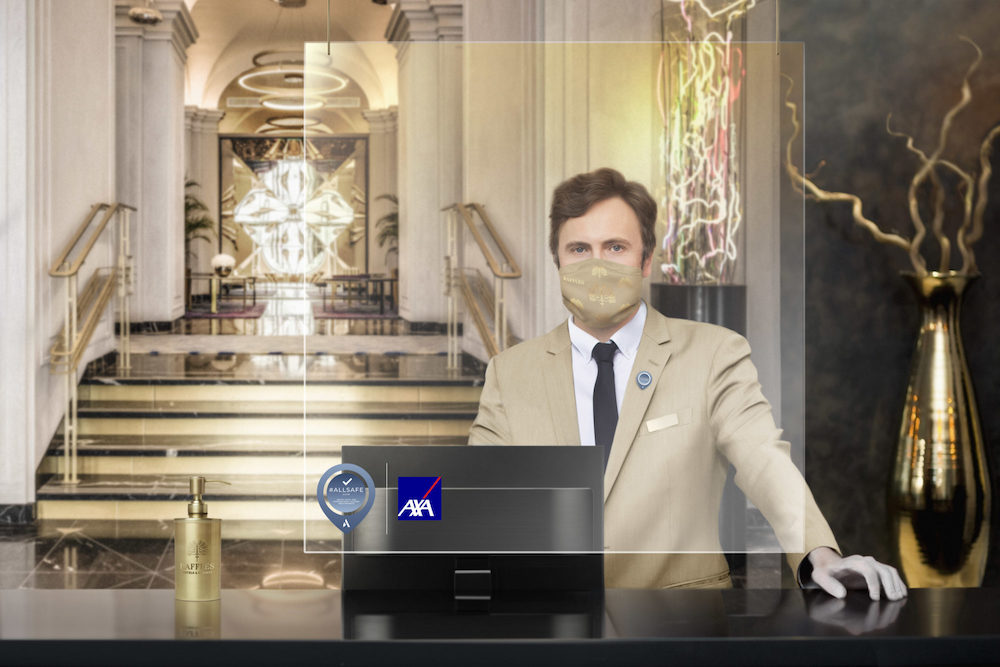 Many hotels, including those in the Accor group (pictured), are implementing heightened safety and cleaning protocols to prevent against coronavirus spread.
Photo: Accor
Many hotels, including those in the Accor group (pictured), are implementing heightened safety and cleaning protocols to prevent against coronavirus spread.
Photo: Accor Hotels around the world are introducing myriad branded campaigns to reassure guests that they’re taking steps to protect them from the coronavirus outbreak. Some are testing out robots as housekeeping staff or creating rooms that clean themselves. Most, though, are doubling down on the basics. From international five-star boutique brands to near-ubiquitous domestic chains, many hotels and resorts are announcing inspiringly-named plans to expand their cleaning procedures and re-evaluate guest interactions.
While opening dates, guest limits, and legal regulations vary by country and state, there are many similarities among these plans, such as more frequent overhauls of public areas, wipes and sanitizer stations throughout properties, sealed plated meals, digital check-ins, and the removal of pens, remotes, and other shared items from rooms. But the most notable commonality is that hotels want them to be highly visible to guests. The hope is that if visitors can see proof of cleanliness—and understand the steps being taken by staff members in that vein—they’ll feel reassured. That’s why most have branded their protocols with a strong-sounding name, partnered with globally respected public-heath advisers, and publicly detailed their plans on their websites.
Below, we’ve compiled many of the safety and sanitization programs introduced by major accommodation brands around the world. As of yet, there is no global certification process for cleanliness; however, some countries have introduced voluntary certification programs, and we’ve listed those too.
It remains to be seen how well any of these plans will actually be carried out at each individual hotel—so please let us know in the comments what you’re finding at these properties if you stay at any of them.
HOTELS AND RESORTS
Accor (which includes Banyan Tree, Delano, Fairmont, Orient-Express, Raffles, and Sofitel)
Th Accor group unveiled its newly branded ALLSAFE standard, developed in conjunction with Bureau Veritas (a 200-year-old international company that specializes in testing, inspection, and certification). A detailed description of the ALLSAFE standards are available on Accor’s website; they include measures such as providing guests with sanitizer, wipes, and masks; guest temperature checks; front-desk partitions; contactless check-ins; capacity limits in bars and restaurants when re-opened; and mandatory staff training at each property. Accor has also partnered with AXA insurance to provide telemedicine consultations and access to AXA’s network of medical professionals.
Aman Resorts
Aman has partnered with Diversey (a company that specializes in sanitation and maintenance products and services) to enhance its cleaning procedures based on guidelines from the World Health Organization, as well as from the local authorities at each location of their 37 international properties. The company promises increased staff training and thorough sanitization, although specific protocols may vary from property to property based on a country’s rules and guidelines.
Anantara
Anantara resorts are one brand in the Minor Hotels company based in Thailand, where the Tourism Authority of Thailand has launched a certification process (see below). These plush properties vow to up their sanitization efforts, social distancing plans, and contactless services (including airport transfers, check-in, dining, and fitness), and are consulting with Ecolab, a U.S.-based water, energy, and hygiene technology services company, on new procedures. In keeping with the culinary experiences and cooking classes that have long been a signature part of the Anantara brand, properties are also focusing on immunity-boosting cuisine.
Avani
Avani, like Anantara above, is part of the Minor Hotels group. In addition to digital check-in and check-out, Avani is setting up sanitization processes for luggage and incoming supplies. It’s also looking into sanitization technologies, such as UV sterilization and copper anti-viral coating for keys and other high-touch items, and HEPA-grade air purifiers. After room-turnover cleaning, each room will be sealed for a 24-hour waiting period before the next guest can check in. Avani has also said it will review its third-party partners (transport, tour services, etc.) to make sure they meet the brand’s standards. The number of guests at gyms will be limited and socially distanced, and there will be a mandatory waiting period between groups. As for staff, the procedures vary by country when it comes to frequency of temperature checks; in general, masks are required. In a lighthearted twist, Avani is encouraging its workers to decorate and personalize their masks, an initiative it is calling “Smile Through the Heart.” You can download a PDF of all the new rules in this AvaniSHIELD program here.
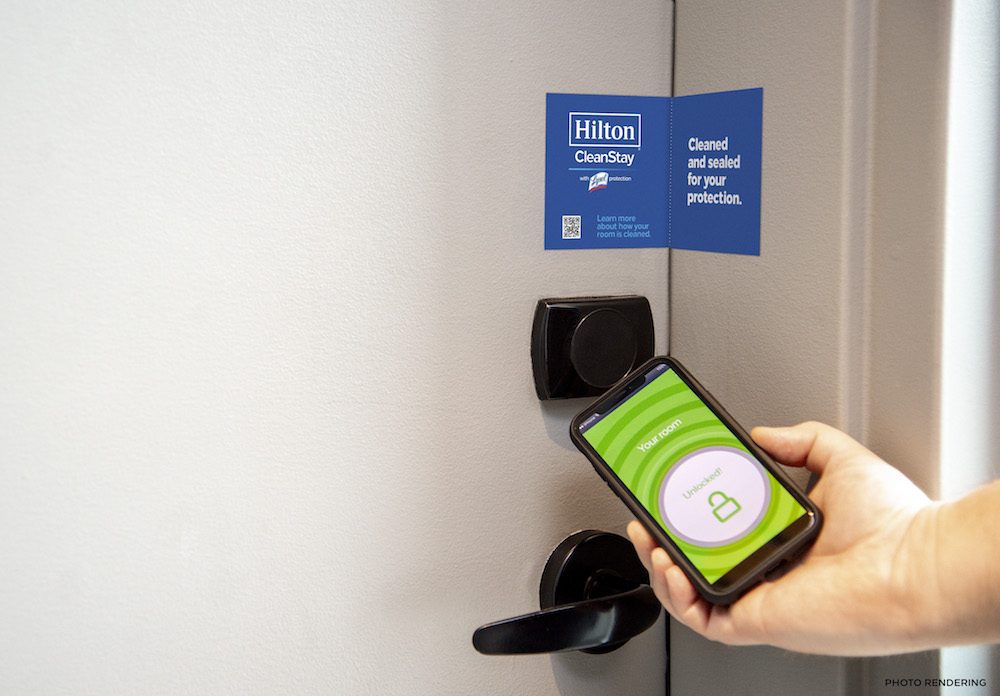
Some hotels, like Hilton will provide post-housekeeping seals on doors and the ability for guests to open their rooms with their own phones. Photo: Will Newton/Hilton
Best Western
Best Western says it has been using UV sterilization wands to clean high-touch items in rooms since 2012, as part of its I Care Clean program. The COVID-19 upgrade to this plan is called We Care Clean. In addition to increasing social distancing in public areas and at check-in, the program outlines specifics such as: Removing unnecessary items like decorative pillows and bed scarves from guest rooms and instituting a waiting period of 24 to 72 hours between guests during which the room (and even its hangers) will be disinfected. Read the full plan from Best Western. Best Western is also one of several hotel brands that has agreed to follow the American Hotel and Lodging Association’s (AHLA) new initiative for best practices in the U.S. hotel industry (see USA, below).
Four Seasons
After repurposing the Four Seasons New York into accommodations for healthcare workers, the brand is implementing changes across its properties via the introduction of its Lead With Care program, with input from Johns Hopkins Medicine International. The details include a hygiene officer at each property, hourly cleaning of public areas, rooms disinfected daily, a-la-carte restaurant service with digital menus, health-focused employee training, and in-room amenities kits with masks, sanitizer, and wipes. The program is overseen by a special COVID-19 Advisory Board, made up of hotel leadership and representatives from Johns Hopkins Medicine International.
Hilton (which includes Conrad, Curio, Embassy Suites, and Waldorf Astoria)
Launching in June, Hilton’s program is called CleanStay with Lysol protection. As the name implies, the effort is in partnership with the makers of Lysol and Dettol (a company called RB). Staff from the Mayo Clinic’s Infection Prevention and Control team will serve as consultants on quality assurance, training, and new approaches. In addition to what’s becoming the standard safety upgrades (e.g. contactless check-in, guest-accessible disinfecting wipes in elevators and other high-traffic spots, more frequent cleaning of public spaces), Hilton will also introduce its CleanStay Room Seal on guest-room doors, to indicate to guests that no one has entered the room since it was cleaned. That cleaning is said to be upgraded too, with a focus on ten high-touch areas for disinfection (remote controls, handles, light switches, etc.) and the removal of amenities such as pens, paper, and guest directories. Hilton is made up of 18 brands, which have a total of more than 6,100 properties.
Hyatt (which includes Andaz and Park Hyatt)
Hyatt’s plan, called the Global Care & Cleanliness Commitment, sees the chain working with the Global Biorisk Advisory Council to earn GBAC Star accreditation. This quality mark—overseen by a branch of ISSA, the cleaning industry’s global association—denotes facilities (hotels, medical facilities, planes and trains, schools, and more) that meet high standards for cleaning, disease prevention, professional training, and public safety. By September 2020, every Hyatt property is supposed to have at least one trained Hygiene Manager onsite to enforce these new protocols, which will include enhanced and more frequent sanitization, hospital-grade cleaning supplies, protective masks worn by staff, and social-distancing guides in public areas.
Langham
The Langham Hospitality Group’s list of safety steps includes more frequent disinfecting of public areas (especially elevator buttons, door handles, and handrails) and sanitizer dispensers or bottles added to high-traffic areas. They’ll also be taking temperature readings of all staff before each shift and requiring guests to fill out a form detailing their recent travels. In restaurants and bars, chefs will wear face masks and single-use disposable gloves, tables will be disinfected between diners, and all public surfaces (e.g., door handles, reception desk, credit card machines) will be sterilized every 30 minutes. Spas and fitness centers will implement disinfection every half hour, sterilization of spa equipment after each guest and again overnight, and temperature readings for all spa guests (along with a health declaration form), and there will be no more hot or cold towels handed out.
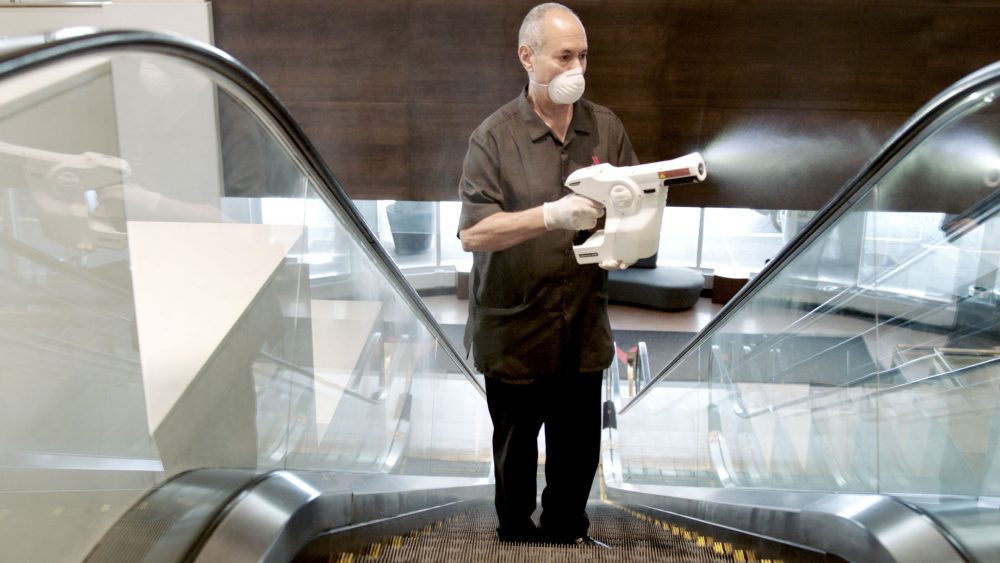
Marriott is one of several hotel brands introducing the use of electrostatic sprayers to disinfect high-touch surfaces. Photo: Marriott
Marriott (which includes Edition, Le Meridien, Ritz-Carlton, St. Regis, The Luxury Collection, W Hotels, and Westin)
At its more than 7,300 properties around the world, Marriott says it will be using electrostatic sprayers to disperse CDC- and WHO- recommended disinfectants on high-touch surfaces and public areas, testing UV light technology to sanitize room keys, increasing social distancing by removing or rearranging furniture in lobbies, adding hand-sanitizer stations throughout properties, providing staff with gloves and masks, and offering contactless check-in and room service via guests’ phones. The initiatives will be overseen by the new Marriott Global Cleanliness Council, comprised of hotel staff and various experts, including an infectious disease specialist, a food microbiologist, a food-and-water-safety specialist, and the head of Purdue University’s School of Hospitality & Tourism Management.
MGM
After closing its domestic properties in March, MGM Resorts will begin reopening on June 4 with the Bellagio, New York-New York, and MGM Grand and the Signature. The brand’s strategy is simply called the Seven-Point Safety Plan, and it outlines employee temperature checks and health screenings (and self-screening for guests); mandatory masks and PPE for employees and a request that guests wear masks in public spaces (provided free of charge); physical distancing through floor guides, Plexiglas partitions, and signage; heightened cleaning procedures, sanitization of high-touch surfaces, and the addition of hand washing stations; reviews of heating and air conditioning systems to ensure air quality; new response protocols if a guest or staff member is sick (in addition to medical personnel on staff); and digital amenities such as contactless check-in and digital food menus for guests’ personal phones. When it comes to how to keep guests safe in MGM’s casinos, they’ll be asked to limit their drinking and completely avoid eating—in order to minimize the time when they’re not wearing masks. You can read the full details of the plan on the MGM website.
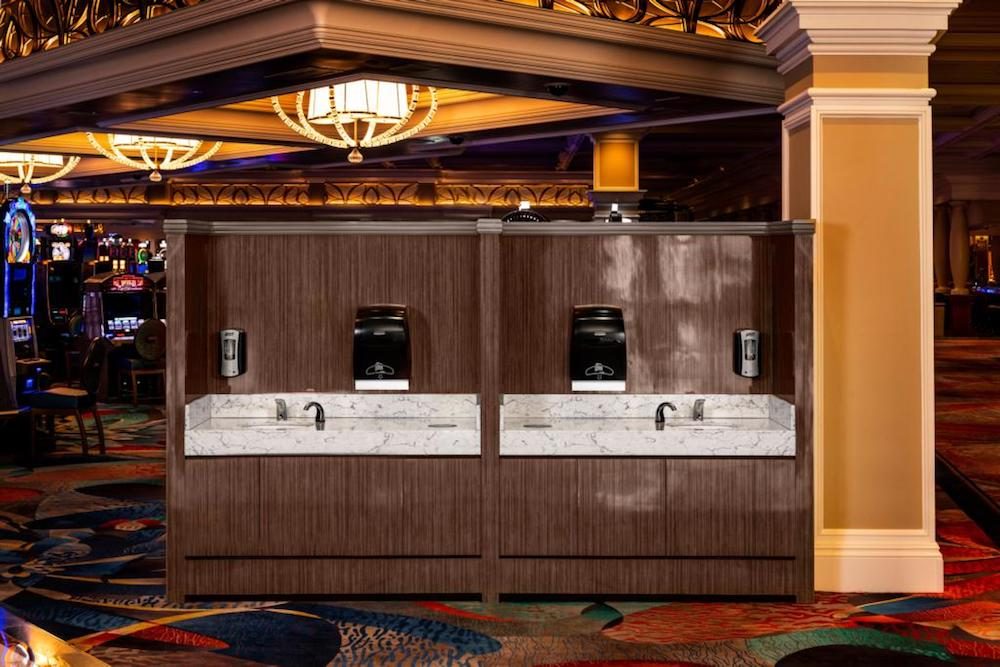
MGM Resorts will install hand-washing stations like these mock-ups. Photo: MGM Resorts
Montage International
Montage announced a two-pronged approach to easing any covid-related stress a hotel guest might feel. In terms of housekeeping, they say they’re increasing the frequency of sanitization and deep cleaning for high-touch areas; incorporating electrostatic sprayers and UV wands into that effort; introducing social distancing design in restaurants, bars, lounges, gyms, pool areas, and other public areas; and providing hand sanitizer and facial coverings to all guests. The other prong is virtual medical care: Montage has partnered with One Medical to provide each guest with a 30-day membership to One Medical’s digital health services via video chats, messaging, and an app. (The hotel group’s U.S.-based staff will each receive a year-long membership.)
Omni
The “Omni Safe & Clean” initiative follows CDC guidelines and American Hotel & Lodging Association recommendations (see USA, below). Those include contactless services, single-use room amenities, plated and individually sealed foods, public areas (including pools and spas) marked and re-arranged for social distancing, and housekeeping seals placed on rooms after each cleaning. Each of the brand’s properties is also supposed to adhere to local and/or federal mandates as required.
Rosewood
Partnering with Ecolab and Diversey, and following guidance from the CDC, WHO, and local authorities, Rosewood has rolled out its Commitment to Care Global Health and Safety Program. Lobbies, public bathrooms, elevators, and other public spots should see increased cleaning and disinfecting, and air filters and air conditioning systems should get more frequent treatment too. Rosewood is exploring new sanitization technologies such as electrostatic sprayers, foggers, and ultraviolet-UVC light. When legally allowed, guests and staff will have their temperatures screened when they enter the hotel. On the inside, guests will benefit from contactless services (check-in/check-out, in-room dining) and receive amenity kits with face masks, wipes, and sanitizer.
Sandals
Sandals beach resorts have instituted Platinum Protocols of Cleanliness, an 18-point plan that starts when guests land at the airport: The usual Sandals and Beaches private arrival lounge will now have hand sanitizer and complimentary mask, and the private-vehicle transfer will be stocked with more PPE and sanitized between trips. When they get to the resort, guests will have their temperatures checked (anything 99.5 degrees or less gets you the green light). From there, they will see assurances of cleanliness such as daily replacement of all linens, post-cleaning seals on the doors, and bellmen/butlers who spray disinfectant on both sides of door handles when leaving the room. Bathrooms will be cleaned every half hour, restaurants will have hand sanitizer at entrances, pool chairs will be sanitized daily and separated by six feet or more, and guest temperatures will be checked again before they can use the spa or fitness centers. If anyone is not feeling well, there are medical personnel onsite.
Shangri-La
Following recommendations from the CDC, Shangri-La has posted a list of the ways it is approaching COVID-19 safety. Some examples: Each guest’s laundry will be handled in individual packaging, public washrooms are cleaned with hospital-grade disinfectants, guests are asked to fill out health and travel-plan forms, incoming luggage is disinfected, temperature screenings take place at entry points, limos are disinfected between each use, special disinfectant floor mats are placed at entries to clean people’s shoes, and all pools, whirlpool baths, saunas and steam rooms are closed.
Wyndham
Wyndham is one of several hotel brands working with the ALHA (see USA, below) to create and follow best practices for the U.S. hotel industry. Specifically, they have drawn on the expertise of Ecolab, a US-based water, energy, and hygiene technology services company, and the CDC to launch its Count on Us program. This means that all of Wyndham’s 6,000 U.S. properties should be introducing measures such as handing out wipes with room keys at check-in, placing complimentary travel-size hand sanitizer in each room, providing more frequent cleanings, and increasing social distancing in public areas.
VACATION RENTALS
Airbnb
In April, the home-sharing service announced it would be launching two tools that hosts can use to safeguard their rentals for guests. Both are optional. One is the Airbnb Cleaning Protocol, a learning and certification process for hosts that recommends enhanced cleaning and disinfecting procedures. Guests will eventually be able to identify the listings enrolled in this program via a call-out on the website. Hosts who don’t opt into the Cleaning Protocol can use the Booking Buffer, which enables them to block out a 24- to 72-hour waiting period between guests. (The CDC recommends a 24-hour waiting period between guests.)
VRBO
Similar to Airbnb, the vacation-home-rental service VRBO is trusting its hosts to provide safe environments for their guests. To make that easier, VRBO (which is owned by the Expedia Group) is providing hosts with info on cleaning and disinfecting based on information from the WHO and CDC and created in consultation with the Vacation Rental Management Association (a trade association) and Cristal International Standards (a quality-control company for the hotel industry). Hosts can then showcase their cleaning processes and safety measures on their listings pages (e.g. if they use disinfectant to clean or if check-in and check-out is contactless).
GUIDELINES AND STANDARDS BY COUNTRY
Abu Dhabi, UAE
Abu Dhabi’s Department of Culture and Tourism just announced a “safe and clean certification program” for tourism businesses including hotels, malls, and more. The specifics and standards of the process have not yet been released, but hotels will be the first group to undergo certification, followed by other tourism attractions and organizations.
Britain
Although Britain isn’t ready for travelers yet (and Prime Minister Johnson recently announced a 14-day quarantine for incoming visitors), its national tourism arm, Visit Britain, has already announced it is developing a quality mark to denote hotels and other tourism sites that adhere to certain COVID-19-related safety standards. What those standards will be has not yet been decided.
Portugal
The national tourism board of Portugal, Turismo de Portugal, launched a “Clean & Safe” certification for hotels and tourist sites on April 24. To earn the validation, the hotel (or other company) must sign a Declaration of Commitment to certain hygiene and cleaning processes informed by the country’s Directorate-General of Health. Participation is free and optional, and Turismo de Portugal will carry out audits of those who opt in.
Singapore
The Singaporean government has created the SG Clean certification. Hotels, restaurants, hawker centers, shopping malls, and cruise terminals that adhere to a list of criteria will earn the quality mark, and many already have. You can see a full list of all certified establishments at sgclean.gov.sg.
Thailand
The Tourism Authority of Thailand (TAT) has announced a certification plan called “Amazing Thailand Safety and Health Administration: SHA.” To earn the certification, establishments must adhere to COVID-19 safety standards set by the Ministry of Health and other official public-health institutions. The process and criteria are currently being established and will focus on ensuring hygiene and sanitation while also maintaining local culture and interaction between communities and tourists.
USA
The American Hotel & Lodging Association (AHLA) is the industry trade group for hotels, inns, bed-and-breakfasts, and hotel management companies. Based on input from the CDC, the hotel industry, and experts in medicine, science, and public health, the organization launched the Safe Stay initiative, a set of suggested standards aimed at making U.S. hotels safe for guests. The best practices include enhanced cleaning methods, social-distancing policies, and the use of approved sanitization supplies. Although Stay Safe is a voluntary program for now, you can check the AHLA website to see which hotels are choosing to adopt it. The ALHA’s goal is to change U.S. hotel industry norms and create an official certification process.
This article was originally published May 22.
Be a smarter, safer traveler: Sign up for Wendy’s weekly newsletter to stay in the know.

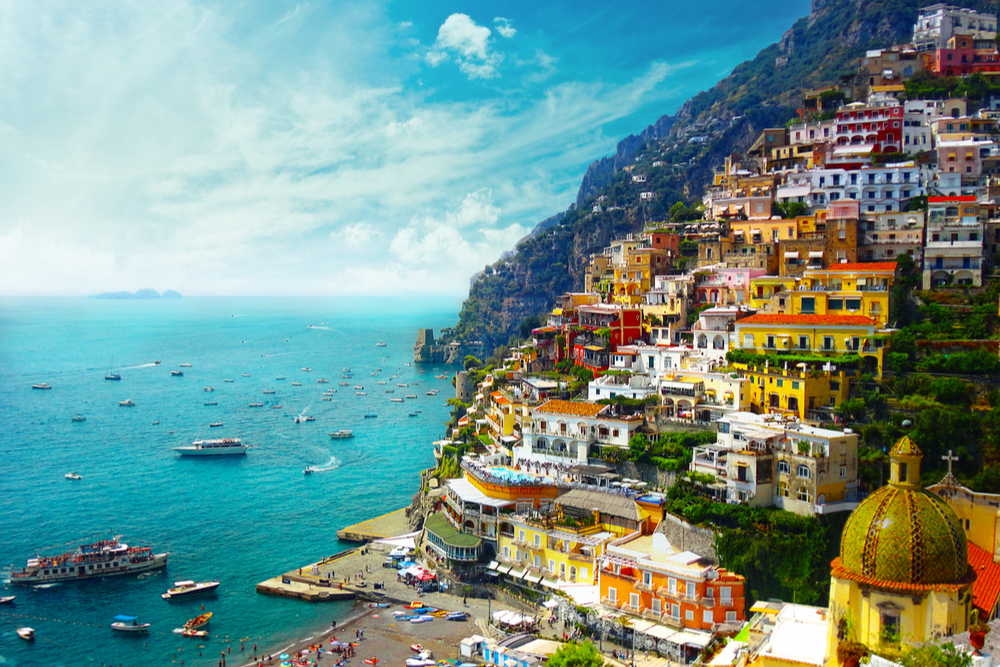
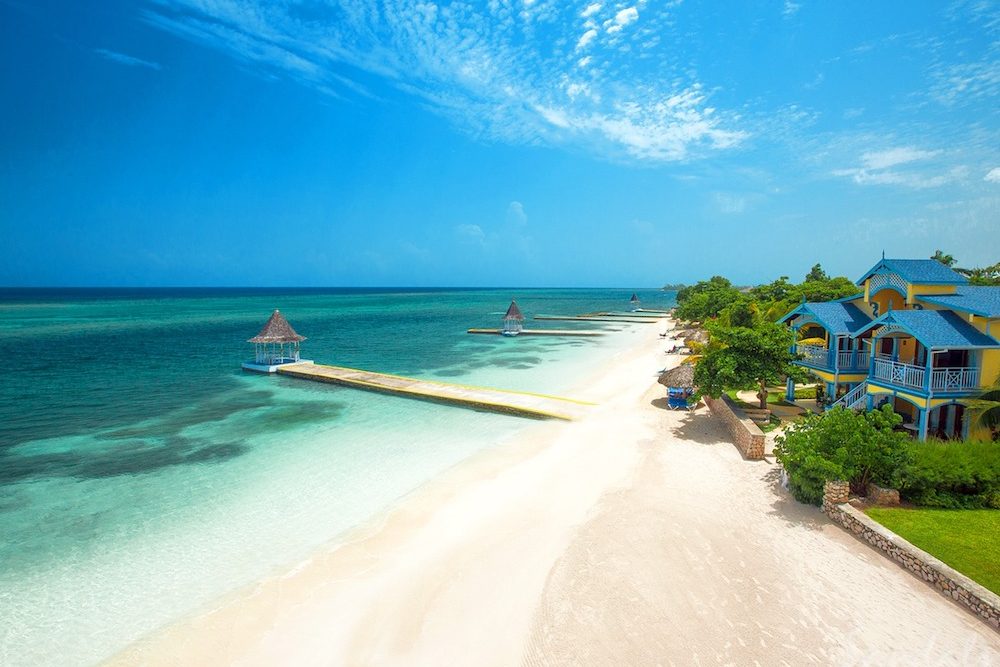
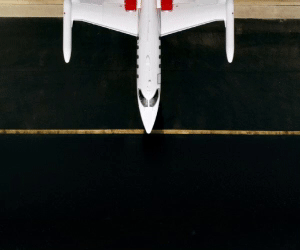

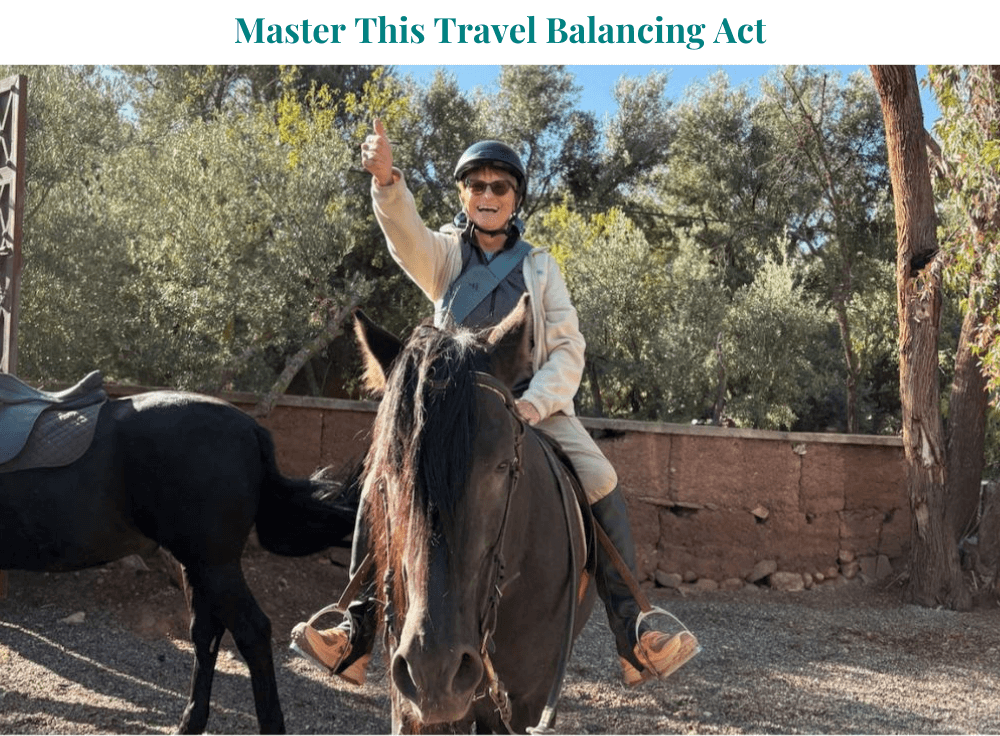



Bad experience with Marriott! I was driving alone (62yr old female) from Arkansas to Ohio yesterday, and had a confirmed reservation on phone with front desk, at the Fairfield Inn St. Louis, Fenton. I even called to ask for a first floor room since i did not want to use an elevator during COVID. I arrived and the hotel was closed and there was a sign that reservation is being honored by another Marriott property next door. The hotel Town Center was a dump, no social distancing and none of the guests were wearing masks in the lobby. I immediately told them to cancel my reservation and that I was not going to stay there. I needed to use the restroom, since I had been driving almost 6 hours and made no stops, I had another 6 hrs of driving ahead of me. The only restroom on the lobby was out of order. At no time did Marriott contact me to tell me that they were moving me. I would have made other arrangements, instead I drove all the way home and arrived at 1am! I called Marriott to complain, but we will see what good that will do. Please alert your readers about what Marriott is doing .
What are hotels doing about sleeping PILLOWS?? Sheets are washed at hotels but pillows aren’t.
Great question. I reached back out to the hotels to ask specifically about their pillow protocols. The brands that got back to me (including Accor, Aman, Avani, Rosewood, and Shangri-La) talked about changing pillow protectors and pillowcases. As you guessed, they are not changing or washing the actual pillows.